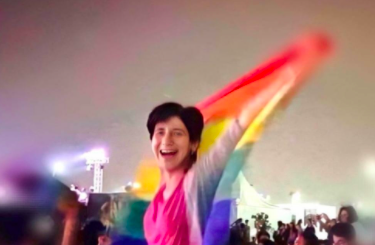By Romy Hildebrand
The queer community has long taught humanity the necessity of hope for social change, said anthropologist Sa’ed Atshan during a virtual talk on LGBTQ movements across the Middle East and North Africa region.
“Losing hope is a luxury that the most downtrodden cannot afford, for it is hope that enables them to get through each day and to imagine surviving the next one,” Atshan said. “Queer hope provides a horizon for peace in the future.”
Anthropologist Sa’ed Atshan, who traced the rise of LGBTQ movements across the Middle East and North Africa region during a virtual talk with UCSB students last week.
Atshan, of Swarthmore College, is currently a visiting professor of Anthropology and visiting scholar in Middle Eastern Studies at UC Berkeley. He met with UC Santa Barbara students on Zoom last week in an event hosted by the Center for Middle East Studies.
Atshan told the story of Sarah Hegazi, a famous Egyptian activist, who openly identified as a lesbian. The Arab Spring revolutionary uprisings that began in 2010 featured overwhelmingly nonviolent protests, Atshan said, and they were successful in overthrowing the government in Hegazi’s home country of Egypt in 2011. But it didn’t last.
“Counterrevolutionary forces have since hijacked the process of democratic transition, leading to a stubborn persistence of autocratic and oppressive governments,” Atshan said. “A child of the Arab Spring, Sarah Hegazi was politicized in this context, becoming a human rights activist in Egypt, giving voice to fellow youth, and daring to dream of a better tomorrow for her nation.”
When the Arab Spring arose, Hegazi was 20 years old. She spent the next decade connecting with other progressive Egyptians and members of the queer community facing homophobia. In 2017, Hegazi attended an outdoor concert in Cairo, featuring the Lebanese band Mashrou’ Leila, whose lead singer was openly gay. While sitting on a friend’s shoulders in the crowd, Hegazi proudly held up the rainbow pride flag.
Sarah Hegazi, an openly gay Egyptian LGBTQ activist, proudly displaying the rainbow flag at a concert in Cairo in 2017. After the image went viral, Hegazi was arrested and tortured. She later committed suicide.
“That image of her claiming public space as a queer woman in this manner will always be imprinted in my consciousness,” Atshan said. After a photo of the event spread on social media, Hegazi was arrested, tortured, and assaulted. “Hegazi ultimately suffered tremendously for her courageous act,” Atshan said. Upon her release, Sarah Hegazi self-exiled to Canada. In June of 2020, she took her own life at the age of 30.
“In a way, Sarah Hegazi became a martyr in the world of queer Arabs,” said Atshan. But for many still living in the Middle East and North Africa, or MENA region, public grieving of the late activist was dangerous. According to a 2013 study by the Pew Research Center, 95% of Egyptians believe that homosexuality should not be accepted by society.
“On social media, many Arab citizens [shamed] anyone who dared commemorate Hegazi, arguing that a queer person and athiest was not worthy of mourning. The deeply entrenched nature of homophobia meant that even in her death, Hegazi could not rest in peace,” Atshan said.
“When juxtaposed with the public acknowledgment of her life, it became heartbreakingly clear that the regimes of control and fear were working to take over the public landscape to further the shunning of queer people,” he said. “At the same time, the outpouring of love and commemoration remained widespread among LGBTQ Arabs globally, and this has strengthened networks and deepened queer solidarity transnationally.” Many queer Arabs would agree that Hegazi’s tragic death was not in vain.
“Within the MENA region, effects of the Arab Spring continue to manifest and history is still unfolding,” Atshan explained. He urged the audience to resist popular narratives which may declare “the end of hope” across the Middle East and North Africa region. “Hope is palpable every day in the Middle East,” he said.
Romy Hildebrand is a third-year Communication major at UC Santa Barbara. She is a Web and Social Media Intern for the Division of Humanities and Fine Arts.



